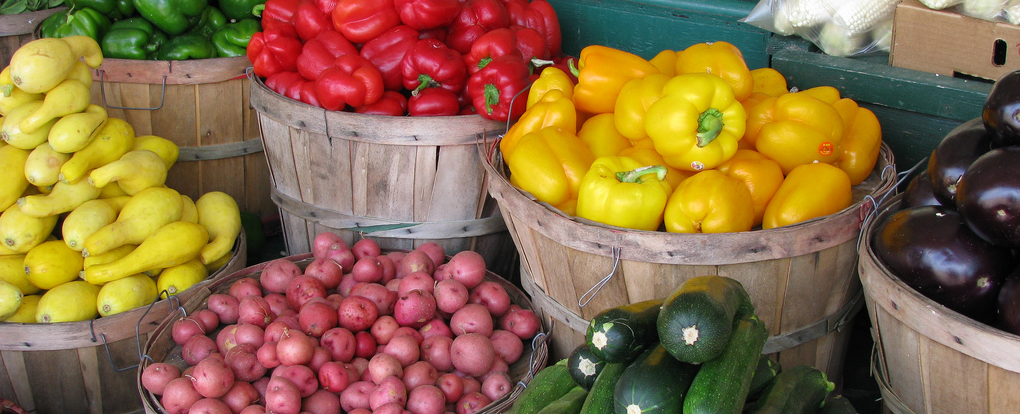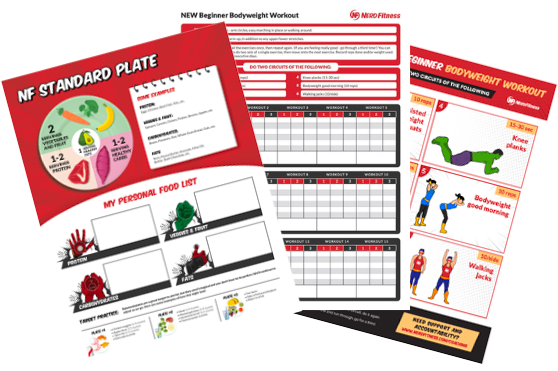
How many of you buy organic food?
In the past six months, I’ve started to put some serious consideration into what I put into my system. After reading the Paleo Diet, Mark’s Daily Apple, and Vin Miller’s Natural Bias, I’ve realized that I was completely unaware of where my food actually came from and what was in it. Up until recently, I was completely okay with this. In fact, I often went out of my way to stay ignorant and oblivious purely out of spite. Let me explain why:
I Hate hype
I hate hype, I don’t like fads, and sometimes I go against what’s popular simply because it gives me something to do. When this organic trend started a few years back, I figured it was just an evolution of the previous food fad: Low Fat! Take out the fat (most of which is probably good for you), add sugar and other super-processed ingredients (which is all bad for you), call it “healthy choice,” and then watch the money roll in. I didn’t buy into that fad, and I didn’t plan on buying into this “fad” either. I mean, come on: they sell organic pop tarts.
When I combined my general skepticism, inherent ability to rebel against certain things for no reason, and the truckloads of money brought in by the organic food business ($52 billion in 2008), it’s easy to see why I refused to jump on the bandwagon.
Then, yesterday happened.
Food Inc.
Yesterday I finally watched the documentary, “Food, Inc.”
I won’t go into great detail about the movie as that can be found anywhere on the net (Read Ebert’s really good review here). Just go rent it or watch it on instant queue through Netflix. After all the reading I’ve done, books I’ve studied, and people with whom I’ve conversed over the past year, I was already tipping in this direction – the movie finally put me over the edge: I’m going to start eating more organic foods. I’ve come to this decision for a few main reasons:
- My health – All of the various outbreaks and diseases and recalls come from food products that are heavily engineered and loaded with all kinds of artificial/dangerous crap. If I’m going to put something in my system, I’d like to know what it’s made of and where it came from.
- Competition is good – Right now, a few big companies control the food industry in this nation. McDonald’s is the world’s biggest buyer of tons of products, giving them incredible influence and power. Supporting local farmers and organic food is sort of like supporting Linux over Windows. Everybody loves a good underdog story; here’s your chance to be a part of one.
- Primal Reasons – We’re designed to eat naturally grown fruit, vegetables, and meat. Adding chemicals and pesticides, and genetically engineering our food isn’t natural and can’t be good. Not enough studies have been done to prove that these changes we are making to nature aren’t going to come back and bite us in the ass.
- My spite was misdirected – Turns out eating organic food is how to go against the trend, considering the rest of this country is eating poorly, getting sick, and becoming more overweight by the day. I had it backwards.
What does Organic Mean?
When you walk into a supermarket, you see all kinds of stuff that are labeled “organic.” Other than the higher price tag, do you really know what you’re getting? I certainly didn’t, so I did some digging. Here is what’s required in order for food to be labeled organic:
- “100% Organic”: Can only contain organic ingredients, meaning no antibiotics, hormones, genetic engineering, radiation or synthetic pesticides or fertilizers can be used. Can display the USDA organic logo and/or the specific certifying agent’s logo.
- “Organic”: Contains 95% organic ingredients, with the balance coming from ingredients on the approved National List. These products can also display the USDA organic logo and/or the certifier’s logo.
- “Made with Organic Ingredients”: Must be made with at least 70% organic ingredients, three of which must be listed on the package, and the balance must be on the National List. These products may display the certifier’s logo but not the USDA organic logo.
What about meat? Every piece of meat these days is labeled with some term that insinuates “good and healthy,” but it’s pretty unclear what all of these things mean. Fortunately, Tim Ferriss over at the 4 Hour Workweek broke down what these different labels mean, and which ones you should be looking for: (“humanely raised,” “certified humane,” and “biodynamic” are the ones to look for). There’s a lot of marketing terms thrown around when it comes to meat, so you need to be careful:
We can’t be sheep – I came across a great article over on Vin Miller’s “Natural Bias” site, discussing the issues with the “organic” labeling system. It’s up to us to actually take the time and understand what we’re eating instead of blindly buying into the hype. This is a “for profit” industry, which means there will definitely be people out there trying to exploit it. Yes, doing so requires a few extra minutes reading a label or finding out where the food came from. In the long run though, a few extra minutes here and a few extra bucks there could mean a world of difference for your health.
Are these companies selling out? Or scaling up? As it turns out, the major food makers are buying as many organic companies as possible (here’s a great PDF showing what’s up). Honestly, I don’t know how to feel about this. Part of me thinks these companies are just looking for the cheapest way to take over the organic food industry too, while the rest of me thinks this might be a good thing – by operating under these big umbrella companies, the smaller brands (as long as they keep their standards) will have better access to a larger market with improved channels of distribution.
What’s Important to Buy Organic? What Isn’t?
Is it important to eat EVERYTHING organic, or can you get away with just some stuff? Once again, I had no clue, so I set out to find the answer. Research FTW!
FRUITS AND VEGETABLES – According to the Environmental Working Group, these thirteen fruits and vegetables purchased from normal stores had the most toxins and pesticides in them. That means you should be buying organic whenever possible:
- Peaches
- Apples
- Sweet bell peppers
- Celery
- Nectarines
- Strawberries
- Cherries
- Lettuce
- Grapes (imported)
- Pears
- Spinach
- Potatoes
If you have a tight budget (and who doesn’t these days), you can get away with not spending more for organic versions of the food fruits and veggies listed below:
- Bananas
- Kiwi
- Mangoes
- Papaya
- Pineapples
- Oranges
- Asparagus
- Avocados
- Brussel sprouts
- Broccoli
- Onions
There’s a pretty good read up on Smart Money on how to not break the bank when buying organic food. They discuss which foods to buy, which to avoid, and where to look to get the deals. They also explain why some fruits/veggies should be organic and others don’t need to be.
MEAT – After research, meat is clearly one thing that absolutely needs to be purchased from organic sources. Your options are to either buy from a local butcher or search out meat that is “humanely raised,” “certified humane,” and “biodynamic.” In case you missed it earlier, here’s a link to how to read meat labels properly.
DAIRY – From what I’ve found, it sounds like it’s a smart move to buy organic eggs. However, the jury is still out on organic milk. According to MSNBC, the benefits don’t really outweigh the cost. I found this other controversial article where a veterinarian advises against buying organic milk for other reasons. I still don’t know if organic milk part of the organic hype machine or is there enough benefit to outweigh it’s incredibly high price. (More about this at the bottom.)
My Plan
I’m still a skeptical S.O.B., but I think this is a good move. I’m going to have to be creative with my money, decisive on what I decide to eat organic and what I continue to eat normally, and I need to make sure I cut through the BS and buy the stuff that is ACTUALLY good for me. Here’s the plan:
- Make a list of everything I eat, and determine what I need to buy from where. I eat a lot of apples, strawberries, lettuce, and spinach. After reading about how these are four of the most pesticides-filled fruits and veggies, I’m definitely going organic for these things.
- Visit a Whole Foods. I have never been inside a Whole Foods, and I’m actually a little scared to go in there. I like the safe confines of my Kroger right down the street, but I feel like I need to at least walk into one Whole Foods to see what it’s all about. Also, I want to see if the prices are really as bad as everybody says.
- Hit up Trader Joe’s more often – I drive right past a Trader Joe’s every day to and from work, but never go in because it’s so freaking busy. However, the one time I did make it in there I found tons of products with reasonable prices and a stronger emphasis on being of really high quality. It might be worth an extra trip late at night when it’s not so busy.
- Find a solution for all the chicken I eat. I eat a ridiculous amount of chicken, so I’d like to find a way to eat a ridiculous amount of HEALTHY chicken. Looks like I need to do more chicken research. [CHECK THE COMMENTS – good discussion on “Free range” chicken and what that really means]
- Farmers Markets – I realize that I’ve missed the window for farmer’s markets…but I found one that’s located right down the street from me and operates from April through November. Come April I’ll be prepared to start making it a weekly visit. Eat better+ support local farmers = win.
- Research Organic Dairy – I’m not much of an egg guy, but I do love me some milk. At this point, I really don’t know if it’s worth the extra money to buy organic milk. From a health perspective it looks like it might not be, but I need to do more research. Your input on this would be extremely helpful.
I Need Your Help!
I’m a total n00b on this stuff, so I’d love to hear your thoughts. If you eat organically, what do you do during the winter months when your favorite foods are out of season? Is Whole Foods full of it, or is it priced high for a good reason? Is organic milk worth it? How would you change my plan?
Let’s hear it. I need your help!
[edit – if you’re just reading now, make sure you check out the comments. Lots of good discussion in there]
-Steve
###


